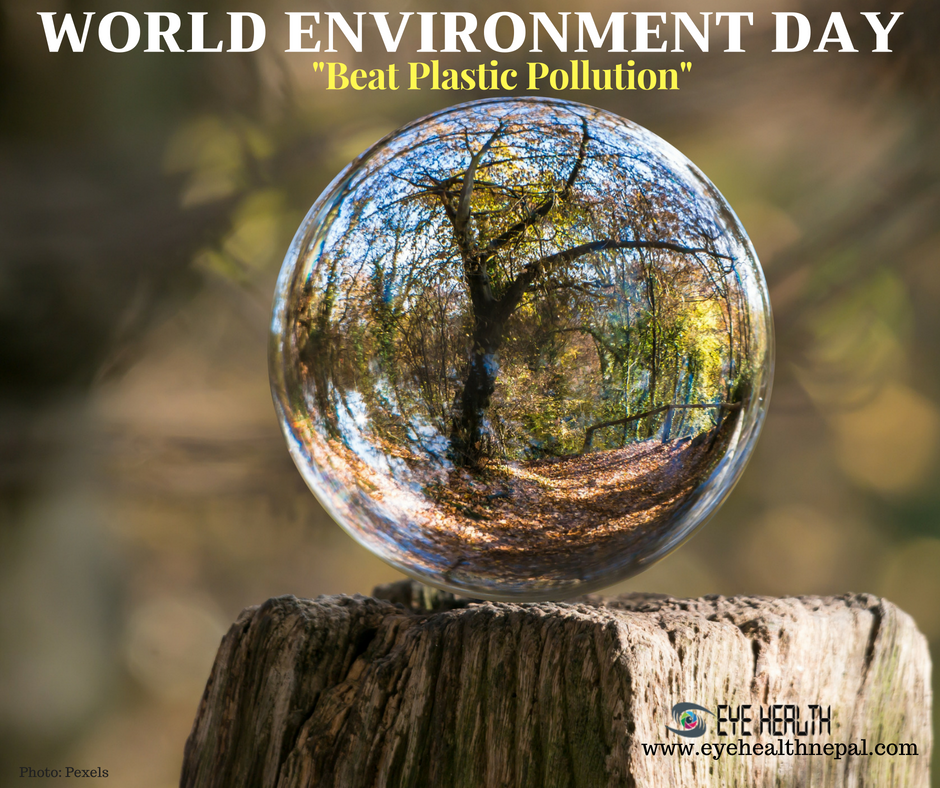World Environment Day
BEAT PLASTIC POLLUTION
Global Plastic Pollution by the Numbers:
- Up to 5 trillion plastic bags used each year
- 13 million tonnes of plastic leak into the ocean each year
- 17 million barrels of oil used on plastic production each year
- 1 million plastic bottles bought every minute
- 100,000 marine animals killed by plastics each year
- 100 years for plastic to degrade in the environment
- 90% of bottled water found to contain plastic particles
- 83% of tap water found to contain plastic particles
- 50% of consumer plastics are single-use
- 10% of all human-generated waste is plastic

Key Messages:
- Plastic pollution is a defining environmental challenge for our time.
- In the next 10-15 years global plastic production is projected to nearly double.
- Avoiding the worst of these outcomes demands a complete rethinking of the way we produce, use and manage plastic.
- Individuals are increasingly exercising their power as consumers. People are turning down plastic straws and cutlery, cleaning beaches and coastlines, and reconsidering their purchase habits in supermarket aisles. If this happens enough, retailers will quickly get the message to ask their suppliers to do better.
- While these steps are a cause for celebration, the reality is that individual action alone cannot solve the problem. Even if every one of us does what we can to reduce our plastic footprint – and of course we must – we must also address the problem at its source.
- Consumers must not only be actors but drivers for the behaviour change that must also happen upstream.
- Ultimately, our plastic problem is one of design. Our manufacturing, distribution, consumption and trade systems for plastic – indeed our global economy – need to change.
- The linear model of planned obsolescence, in whichitems are designed to be thrown away immediately after use, sometimes after just seconds, must end.
- At the heart of this is extended producer responsibility, where manufacturers must be held to account for the entire life-cycle of their consumer products. At the same time, those companies actively embracing their social responsibility should be rewarded for moving to a more circular model of design and production, further incentivizing other companies to do the same.
- Changes to consumer and business practice must be supported and in some cases driven by policy.
- Policymakers and governments worldwide must safeguard precious environmental resources and indeed public health by encouraging sustainable production and consumption through legislation.
- To stem the rising tide of single-use plastics, we need government leadership and in some cases strong intervention.
- Many countries have already taken important steps in this direction.
- The plastic bag bans in place in more than nearly 100 countries prove just how powerful direct government action on plastics can be.
Themes:
World Environment Day will seek to influence change in four key areas:
Reducing Single-Use Plastics
50% of the of consumer plastics are designed to be used only once, providing a momentary convenience before being discarded. Eliminating single-use plastics, both from design chains to our consumer habits is a critical first step to beat plastic pollution.
Improving Waste Management
Nearly one third of the plastics we use escape our collection systems. Once in the environment, plastics don’t go away, they simply get smaller and smaller, last a century or more and increasingly find their way into our food chain. Waste management and recycling schemes are essential to a new plastics economy.
Phasing Out Microplastics
Recent studies show that over 90% of bottled water and even 83% of tap water contain microplastic particles. No one is sure what that means for human health, but trace amounts are turning up in our blood, stomachs, and lungs with increasing regularity. Humans add to the problem with micro-beads from beauty products and other non-recoverable materials.
Promoting Research into Alternatives
Alternative solutions to oil-based plastics are limited and difficult to scale. This doesn’t need to be the case. Further research is needed to make sustainable plastic alternatives both economically viable and widely available.
Read more at: http://worldenvironmentday.global




